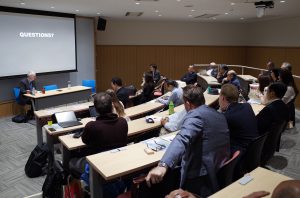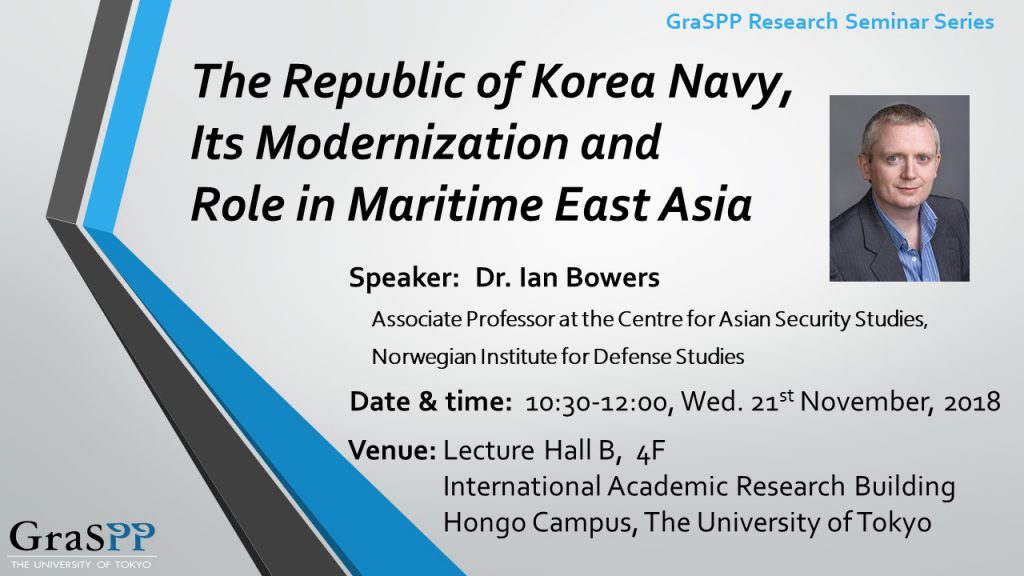Report
On November 21, GraSPP was delighted to host Dr. Ian Bowers, Associate Professor at the Centre for Asian Security Studies at the Norwegian Institute for Defense Studies, to discuss the modernization of the Republic of Korea Navy and its strategic role in East Asia. Professor Chiyuki Aoi chaired the event and Professor Yee-Kuan Heng served as a discussant.
Dr. Bowers illustrated several reasons why is relevant to pay close attention to the Republic of Korea (ROK) Navy. He reasoned that while the Republic of Korea Army is focused on the North Korean threat and peacekeeping, the Navy has a broader mandate that tells a lot about South Korean’s worldview, intent, and vision. Moreover, the Navy is a primary strategic tool rapidly growing in terms of size and capacity. To make an example, Dr. Bowers reminded the audience that the ROK Navy is already twice the size of the Australian one.
 Dr. Bowers also underscored that, for geographical reasons, South Korea is dependent on sea-lanes during peacetime for trade and during wartime for receiving US reinforcements. The ROK Navy maintains these sea-lanes open while, at the same time, projecting power onto North Korea and deterring the Chinese Navy. Dr. Bowers also noted that the ROK Navy helps to support the Coast Guard in the protection of the contested territories and waters. A task which, he argued, is critical to safeguarding the interests of the Korean fishing industry, which employs about 200.000 people and makes up 2 percent of the country’s GDP.
Dr. Bowers also underscored that, for geographical reasons, South Korea is dependent on sea-lanes during peacetime for trade and during wartime for receiving US reinforcements. The ROK Navy maintains these sea-lanes open while, at the same time, projecting power onto North Korea and deterring the Chinese Navy. Dr. Bowers also noted that the ROK Navy helps to support the Coast Guard in the protection of the contested territories and waters. A task which, he argued, is critical to safeguarding the interests of the Korean fishing industry, which employs about 200.000 people and makes up 2 percent of the country’s GDP.
Overall, the mission set of the ROK Navy, as Dr. Bowers explained, is divided into four tasks: deterrence, warfighting, sovereignty protection, and naval diplomacy. To achieve these tasks, the Navy has undergone a drastic process of modernization since the mid-eighties and shifted into a networked and multidomain force. In doing so, South Korea has also developed indigenous capabilities that include shipbuilding, anti-air and ship missiles, torpedoes, and sensor systems. As a consequence, Dr. Bowers explained that the Navy has become more lethal, mobile, connected, multifunctional.
 Changing topic, Dr. Bowers compared the ROK Navy vis-a-vis the North Korean’s, which appears to be in disarray. He provided evidence to shows that, despite having a large fleet, the North Korean Navy has limited force projection and lack of sensors, networking, and missile capabilities. Dr. Bowers suggested that the greatest threat posed by North Korea lies in its submarine fleet and the development of submarine ballistic systems.
Changing topic, Dr. Bowers compared the ROK Navy vis-a-vis the North Korean’s, which appears to be in disarray. He provided evidence to shows that, despite having a large fleet, the North Korean Navy has limited force projection and lack of sensors, networking, and missile capabilities. Dr. Bowers suggested that the greatest threat posed by North Korea lies in its submarine fleet and the development of submarine ballistic systems.
Finally, Dr. Bowers touched upon future scenarios for cooperation among ROK Navy and Japan Maritime Self-Defense Force. Albeit acknowledging the difficulties related to territorial disputes, history, and threat perception, Dr. Bowers believes the two navies have mutual security interests and challenges. For this reason, they would be better of collaborating. Yet, he argued that collaboration would not be achieved until Japan becomes more committed to the Korean peninsula and capable of operating around her seas.
———

Date: Wednesday, 21 November 2018
Time: 10:30−12:00
Venue: SMBC Academia Hall Lecture Hall B, 4F, International Academic Research Building, The University of Tokyo (MAP)
Speaker: Dr. Ian Bowers, Associate Professor at the Centre for Asian Security Studies, Norwegian Institute for Defence Studies
Commentator: HENG Yee Kuang, Professor, Graduate School of Public Policy, The University of Tokyo
Moderator: Chiyuki AOI, Professor (International Security), Graduate School of Public Policy, The University of Tokyo
Language: English
Capacity: 80 person
Registration: Needed. Please register from here
Abstract:
The Republic of Korea Navy (ROKN) is rapidly becoming one of the world’s most powerful naval forces. Yet it remains an understudied organization and is often discounted in wider calculations regarding strategic stability in maritime East Asia. The ROKN has undergone sustained modernization since the early 1990s and having largely achieved superiority over its North Korean counterpart is now developing a new set of missions in case of war on the Korean Peninsula. It also plays an important role in South Korea’s strategic approach to East Asia and is central to Seoul’s military response to China’s rise. This seminar will discuss how deterrence and defense calculations have shaped the modernization of the ROKN. It will examine the ROKN’s operational role in relation to the Korean Peninsula and East Asia. Dr. Bowers will also discuss the future of the ROKN and its increasing cooperation with allies and international partners.
Bigraphy:
Dr. Ian Bowers is an Associate Professor at the Centre for Asian Security Studies, Norwegian Institute for Defense Studies. His research focuses on naval operations in East Asia, South Korean security policy and deterrence in the 21st century. Dr Bowers has published widely, and his work has appeared in the Journal of Strategic Studies, the Korean Journal of Defense Analysis, Global Asia and the Naval War College Review. His latest monograph titled, The Modernization of the Republic of Korea Navy: Seapower, Strategy and Politics was published with Palgrave Macmillan in 2018.
Inquiry: graspp_eventinfo[at]pp.u-tokyo.ac.jp


